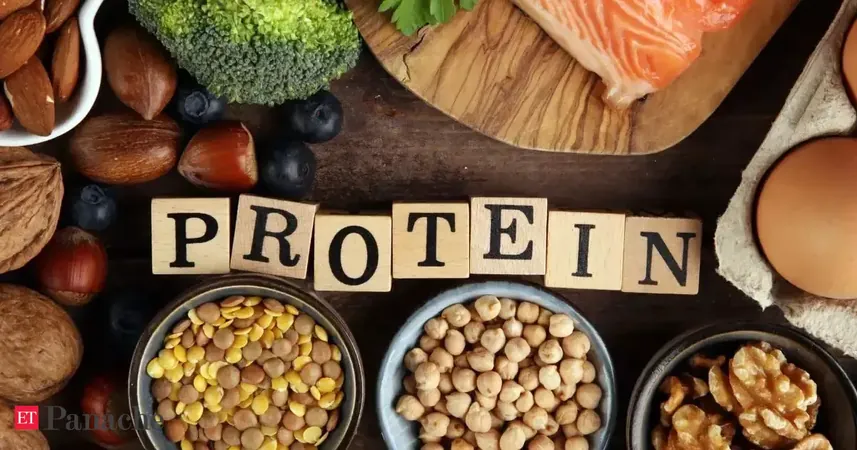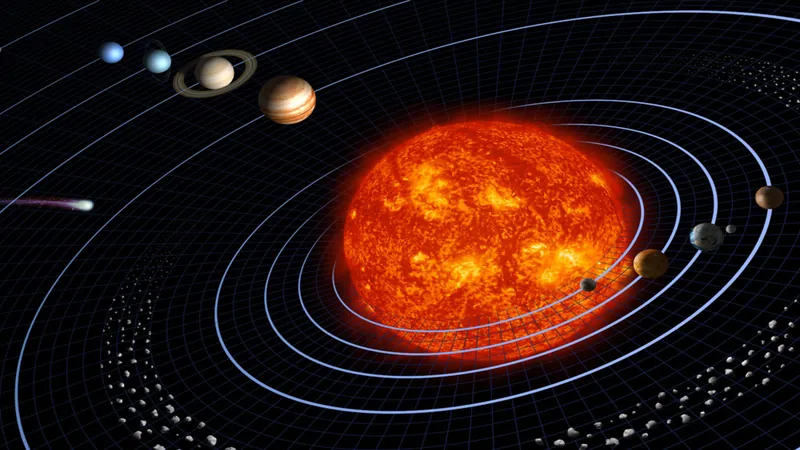
8 Shocking Signs You're Not Getting Enough Protein: What You Need to Know
2025-07-12
Author: Wei
The Importance of Protein for Your Health
Protein is the unsung hero of your diet, essential for everything from muscle maintenance to a robust immune system. When your body doesn't get enough of this crucial nutrient, it may send out distress signals that should not be ignored. Symptoms like swelling, hair thinning, and frequent infections can indicate a serious shortage of protein in your diet.
Warning Signs of Protein Deficiency
Even a mild protein deficiency can lead to a host of health issues over time. Here are eight warning signs to watch out for!
1. Swelling and Puffiness: A Red Flag!
Edema, or swelling, is one of the most noticeable signs of severe protein deficiency. This happens when low levels of albumin in the blood allow fluid to leak into tissues, resulting in uncomfortable puffiness. While commonly linked to extreme cases like kwashiorkor, it underscores the critical role protein plays in maintaining fluid balance.
2. Fatty Liver: A Hidden Danger
Low protein intake can lead to fat accumulating in the liver, which might escalate to inflammation, scarring, or even liver failure. Although the exact mechanisms are still being deciphered, inadequate protein can disrupt essential fat transport processes in the body.
3. Deteriorating Skin, Hair, and Nails
Have you noticed brittle nails or thinning hair? Protein deficiencies can cause these issues and even lead to conditions where more hair enters the shedding phase. In severe cases, such as kwashiorkor, skin may become discolored or peel.
4. Loss of Muscle Mass and Strength
Low protein levels force your body to break down muscle tissue for energy, leading to muscle wasting. This is particularly alarming for the elderly, as even small deficits can speed up muscle loss—a condition known as sarcopenia.
5. Weak Bones: Increased Fracture Risk
Did you know protein plays a crucial role in bone health? Studies reveal that individuals with higher protein intake generally have better bone density, especially in the spine and hips. Insufficient protein can lead to fragile bones and a heightened risk of fractures.
6. Stunted Growth in Children
Children are particularly at risk. Protein deficiency can severely hamper growth and development, contributing to stunting—a widespread issue linked to malnutrition.
7. Increased Vulnerability to Infections
Your immune system needs protein to function optimally. A lack of protein can impair the production of antibodies, making you more susceptible to infections, particularly respiratory illnesses.
8. Insatiable Hunger: A Weighty Concern
If you find yourself constantly hungry, it could be your body’s response to low protein levels. As it tries to restore balance, your appetite may spike, leading to increased consumption of calorie-rich comfort foods. This imbalance can contribute to weight gain and metabolic issues.
How Much Protein Do You Need?
For adults, the recommended daily protein intake is around 46 grams for women and 52 to 56 grams for men. However, those who are physically active or older may require more—up to 0.9 grams per pound of body weight. To ensure you're meeting your protein needs, prioritize a variety of protein-rich foods like eggs, lean meats, dairy, legumes, and soy.
Conclusion: Don't Ignore the Signs!
While protein deficiency is relatively rare in balanced diets, signs like fatigue, swelling, and hair loss could indicate a problem. Recognizing and addressing any gaps in your protein intake is vital for maintaining long-term health. Stay informed and make sure you're fueling your body with the nutrients it needs!


 Brasil (PT)
Brasil (PT)
 Canada (EN)
Canada (EN)
 Chile (ES)
Chile (ES)
 Česko (CS)
Česko (CS)
 대한민국 (KO)
대한민국 (KO)
 España (ES)
España (ES)
 France (FR)
France (FR)
 Hong Kong (EN)
Hong Kong (EN)
 Italia (IT)
Italia (IT)
 日本 (JA)
日本 (JA)
 Magyarország (HU)
Magyarország (HU)
 Norge (NO)
Norge (NO)
 Polska (PL)
Polska (PL)
 Schweiz (DE)
Schweiz (DE)
 Singapore (EN)
Singapore (EN)
 Sverige (SV)
Sverige (SV)
 Suomi (FI)
Suomi (FI)
 Türkiye (TR)
Türkiye (TR)
 الإمارات العربية المتحدة (AR)
الإمارات العربية المتحدة (AR)